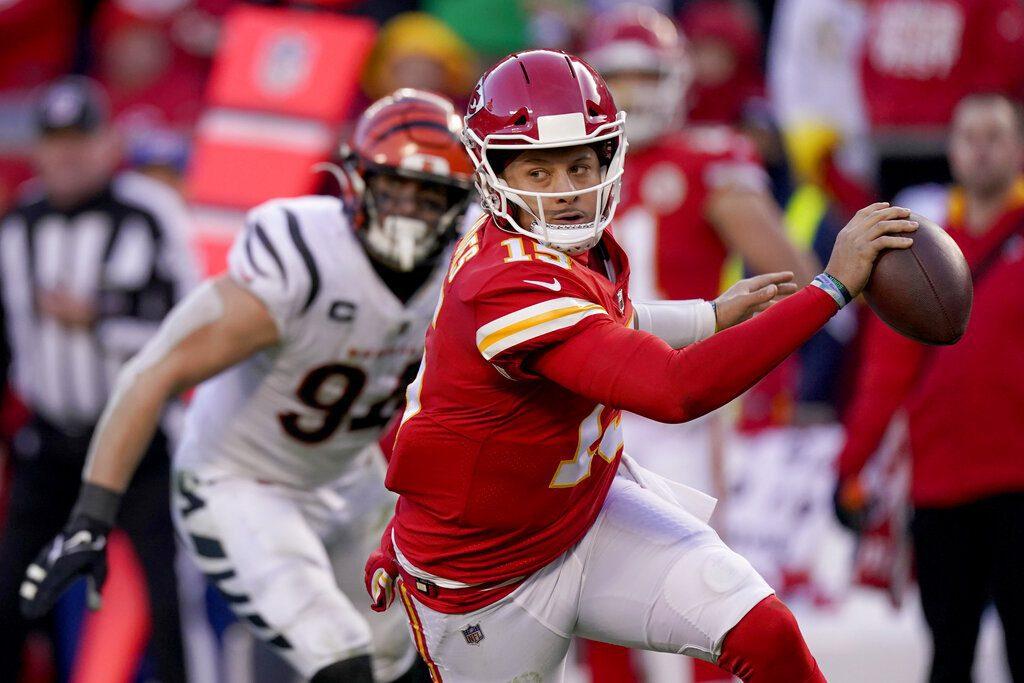Subscribe to our newsletter
We'll send you bets and resources to help you profit
What is an Over Under or Total Bet? Betting Totals Explained
AP Photos
What is a Total or Over/Under Bet?
An over/under bet in the sports betting world is a wager on the total number of points in a game. The important thing to note is that you are not trying to guess the exact amount, just if the total number of points scored will go over or under an amount.
A total bet is the same thing as an over/under bet. The terms are used interchangeably. Please refer below for a real-life example.
Take this Chiefs/Bengals game for example. The total is listed at 50. So, you would need to guess whether the total points of this game would go over or under 50 points.
So, if you bet the over and the Chiefs win 30-28, that would be 58 total points and your bet would win.
Conversely, if you bet the under and the Chiefs won 24-20 that would be 44 points and that would win.
If the Chiefs win 30-20 that would be a push and your bet would be refunded.
There are also over/under bets regarding props too. You could bet Mahomes over/under passing yards 299.5 passing yards or the same thing with over/under 2.5 passing touchdowns.
How to Bet Over/Unders and Totals
Luckily, betting on an over/under is incredibly easy. The total is one of three main markets for every single sporting event, so no matter what sportsbook you use, the over/under is as easy to bet on as a spread or moneyline bet.
All you have to do is go to your desired game you want to bet on, click on the over or under depending which side you want to bet (the over will always be on top), then confirm the bet slip is correct and hit place bet! It is as easy as that.
How are Over/Unders and Totals Calculated?
There are a ton of factors that go into coming up with the game total for an over/under, and the process is different for each sport. Sportsbooks take into account almost any type of stat you can imagine – offensive and defensive efficiency, players injuries, weather, and much, much more to create a total. They also run thousands of game simulations to come up with a total.
For baseball specifically, a huge factor in an over/under is the pitching matchup. So, if an ace gets scratched at the last minute you could see a huge swing in the total.
Over/Under and Total Betting Strategies
Unfortunately, it is not as easy as just betting an over or under and consistently profiting. If it was that easy we’d all be rich!
What I can say is that unders consistently hit at a higher percentage than overs, but still not at a rate where you can bet every under and profit. This is because of the juice that sportsbooks charge.
The reason why unders hit at a higher percentage than overs is because sportsbooks love to take advantage of the psychology of a sports better. It is human nature to root for points, so generally overs get bet on at a higher frequency than unders. Because of this, the market can tend to bet a total higher than it should be. If money is coming in on the over then that amount is bound to increase.
With that said, there are still legitimate strategies and trends that you can follow, aside from normal game analysis.
Season Trends
One thing that is important to keep track of are early season trends, and understand what is just noise and what is legit. One example of this is NBA unders hitting at a historic rate to start the 2021 season. This was a direct result of the new foul rules the NBA instituted, but it took a couple weeks before the sportsbooks caught on. This is also because totals started off the year inflated based on the NBA bubble and 2020 season.
Another example of this was the 2020 NFL season when overs were hitting at over a 60% rate to start. There were two reasons for this. First, because there were no crowds in the stadium due to COVID, offenses were able to operate easier without any crowd noise. The second reason was because of COVID teams had a lack of training camp, and that always has a bigger effect on defenses than offenses.
Weather
For the NFL specifically, one of the most important things you can do is monitor the weather. Just this year in the Patriots-Bills game there was incredible wind gusts, and that game ended up 14-10, going well under the total.
Other Trends
One trend that hits at a high rate but doesn’t happen very frequently are game 7s for the NBA playoffs going under. The logic is not only do players try much, much harder on defense, but generally offensive players are a little more anxious which leads to a worse shooting percentage on open jump shots. Since 2000, the average score for a game 7 is 90-88, which is obviously much lower than any other NBA average score.
Does Overtime Count in Over/Under Bets?
Fortunately for over betters, and unfortunately for under betters, overtime does count for almost every total. The only time OT wouldn’t count would be for specific markets such as 1st half, or a specific quarter. But, anything other than that would count towards the total.
Check out also grand salami betting guide.
